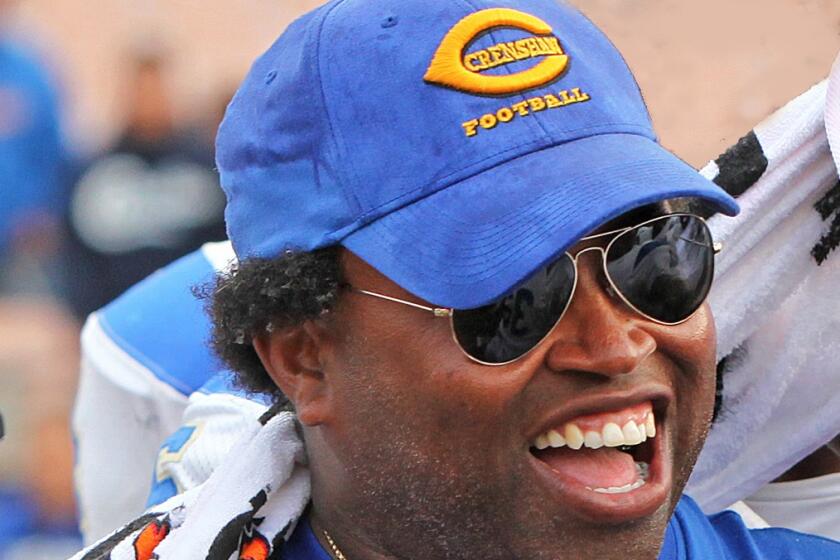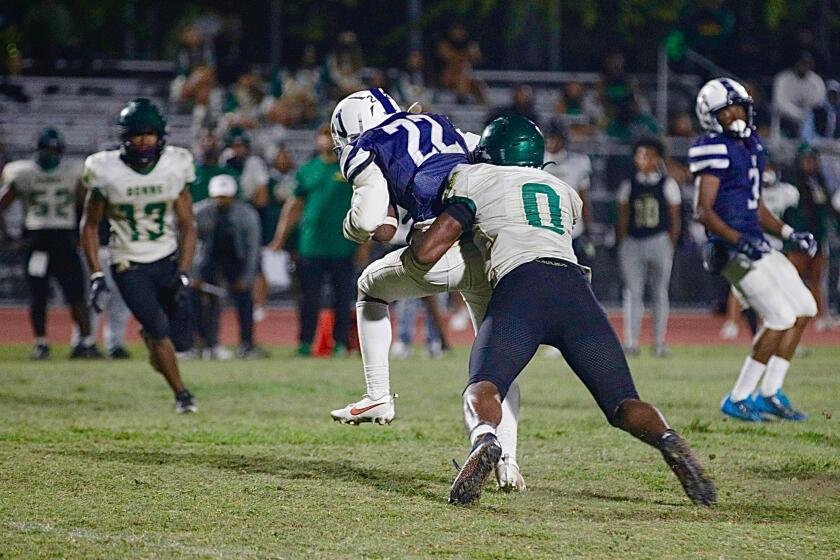Yankeesâ Hernandez Knows True Meaning of Pressure
CLEVELAND â Itâs an old story, so sometimes we forget.
It is a story told every day in our neighborhoods, our stores, our schools, so sometimes we donât listen.
Somebody in some distant land gets on a boat, a bus, their knees. Somebody gives everything for the privilege of arriving in this country with nothing.
They work long hours in hopes of improving their lives, when a funny thing happens. They have improved the lives of everyone around them.
Itâs an old story, so sometimes we forget.
Which made Saturday night here so special, because Orlando Hernandez made us remember.
He doesnât work down the street, he works on a pitching mound for the most glamorous baseball team during the most glamorous time of the season.
But heâs not that different from the immigrant who runs the downtown bank or corner tire shop.
He has felt pressure, and his job is not pressure.
He has known fear, and his day holds no fear.
Hernandez was the starting pitcher Saturday for a mighty New York Yankee team whose manager later conceded was straining under the pressure of trailing the lesser Cleveland Indians in the American League championship series.
It was his first postseason start. At the end of his first American professional season. In front of a juiced-up Cleveland crowd that was howling for the kill.
Compared to that 10-hour trip from Cuba in a rickety makeshift boat with seven other people last winter?
It was an absolute blast.
While his teammates sat stone-faced, he smiled. While they grimaced, he chattered.
And while they waited desperately for something to happen, he made it happen, giving up only three hits in seven innings in leading the Yankees to a 4-0 victory that evened the series at two games apiece.
âToday, luck shined on me,â he said through an interpreter, although his lyrical voice needs little translation. âI had pressure, but I had no fear. I have been through many things like this before.â
He dazzled the Cleveland hitters, striking out both Manny Ramirez and Jim Thome when they represented the tying run with two runners on base in the sixth, allowing only eight of 27 to hit the ball out of the infield.
Which was nothing compared to how he stunned his own.
âThis was the biggest game weâve played all year . . . weâre playing for our lives out there tonight . . . and nothing affects him,â said teammate Paul OâNeill.
Manager Joe Torre knew it even before Hernandez--nicknamed âEl Duqueâ because he was Cubaâs most famous national team pitcher--stepped on the Jacobs Field mound.
âI saw him at brunch today and he asked me how I felt,â said Torre. âI knew then that he was feeling pretty good.â
He began the night working out of a two-baserunner jam by inducing Thome into hitting a high fly ball to right field that landed in OâNeillâs glove at the warning track.
He ended it running, skipping, dancing through the stadium tunnel toward the Yankee clubhouse when he spotted the man who helped him come here, agent Joe Cubas.
He stopped, turned, clenched both fists, and ran into Cubasâ arms.
âThis is a guy who has had to risk his life,â Cubas said. âPitching for him is nothing.â
As Hernandez almost taunted the Indian batters with a variety of motions and pitch speeds--at times an odd combination of Kevin Brown and Trevor Hoffman--the mind wandered.
Was this really the guy whose last truly big game was two years ago for a Havana psychiatric hospital, which he pitched to Cubaâs provincial league title?
Before signing his current $6.6-million contract, was he really making $8.75 a month in Cuba as a physical therapist?
And did officials there really throw him off the team two years ago after planning to defect, later telling him he would not pitch again until he was 40 or 50 years old?
âIt was a very big game for you and a big game for my team, but it was also big for other people of Cuba who are here,â Hernandez said.
One of those is his younger half-brother, Livan, who defected in 1995 and last year was the World Series MVP while pitching the Florida Marlins over these same Indians.
âMaybe I should just go ahead and trade for them all,â said John Hart, Cleveland general manager, referring to members of the Cuban national team.
But Orlandoâs story is not Livanâs story. While Livan defected in Mexico, Hernandez was never even given that chance.
Last winter, on the day after Christmas, at a reported age 28, at the peak of his talents, living in the shack behind a friendâs house and playing third base on a sandlot team, he decided to sail here on the familiar waters of desperation.
The 20-foot boat was 10 hours at sea before landing in a remote area of the Bahamas, where the seven refugees lived for several days before the U.S. Coast guard discovered them.
Is it any wonder that a month later, he was so excited during tryouts for scouts, he chased the foul balls into parking lots?
Or that, on his first day in spring training, he sat and stared at the clubhouse cold cuts buffet?
Or that, before making his major league debut in June, he cried while warming up in the bullpen?
Or that he still cries for the two daughters he left behind?
He wonât talk about those things, but it isnât necessary.
Watching him joyously work the mound Saturday, kicking his left leg, pumping his right fist, another new neighbor smiling like the Fourth of July, we understand.
And maybe next time, we wonât be so quick to forget.
More to Read
Go beyond the scoreboard
Get the latest on L.A.'s teams in the daily Sports Report newsletter.
You may occasionally receive promotional content from the Los Angeles Times.











